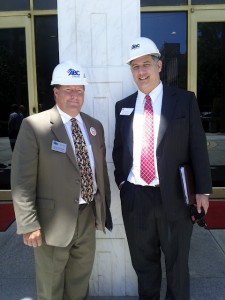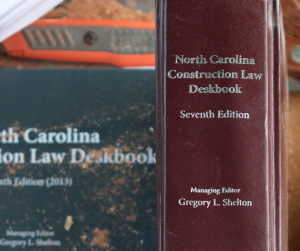
ABC Carolinas President Doug Carlson (left) and I (right) in front of the Capitol Building in Raleigh
The “Lien Agent”: A New Proposal to Address Hidden Liens
By: Gregory L. Shelton
Shelton Law Carolinas
(704) 940-9012
Dear Diary:
Wednesday was a whirlwind of a day.
I woke up hours before dawn and drove to Raleigh for the Associated Builders and Contractors’ NC Hard Hat Day at the Capitol. The annual event brings ABC members to North Carolina, where we don white hard hats and meet with state senators and representatives to discuss issues important to the construction industry.
It rained the entire way, and I barely made it out of the Vortex of Chaos (where West Edenton Street and Hillsborough Street slam into each other and fight each other for supremacy) to reach Natty Greene’s for the briefing session and a blueberry muffin.
When I arrived at the Legislative Office Building, I ran into Keith Coltrain, a fellow member of the Construction Law Section of the NC Bar Association, in the hallway. Keith has been working with other bar sections (including the Real Property Section) on the lien law revision as it makes its way through the house and senate. On this particular day, Keith was attending a meeting to discuss Senate Bill 864 and newly proposed amendments that have reignited discussions about “hidden liens.”
What’s that, Diary? You say you want to know about the proposed amendments? That’s fine, but first you’ll need to know what a hidden lien is, and what’s happened before. So I’ll provide the wavvy lines and flashback music while you look here and here and here and here.
So you see, title insurance companies don’t like hidden liens, and want to solve the problem by requiring the potential lien claimants (particularly subcontractors and suppliers) to provide some form of notice before closing. On the other hand, some subs and suppliers don’t want new paperwork hurdles dropped in front of their liens.
These opposing forces, combined with the short legislative session, resulted in a bill which avoided the hidden lien issue altogether. Once I saw that hidden liens were off the table this year, I predicted that Senate Bill 864 would become law.
Now, after the latest development, I’m not so sure. The title insurance companies have floated a proposed bill entitled “An Act to Require Persons Filing Claims of Lien on Real Property for Improvements to Real Property to Give Written Notice to the Designated Lien Agent of the Owner of the Improved Real Property.” The proposed bill would require potential lien claimants to serve a “lien agent” with a “Notice to Lien Agent” identifying the project, the building permit number, the property description, and the contact information of the potential lienor.
Under the proposed bill, the “lien agent” could be an attorney, a title insurance company, or a banking institution. The lien agent would be identified on the building permit; if the project did not require a permit, the owner would be statutorily obligated to provide the lien agent information upon request. If a potential lien claimant failed to provide notification to the lien agent before conveyance of the property, he would be barred from filing a claim of lien against the property.
The “lien agent” differs from the Florida-style “Notice of Commencement” (filed by the owner) and a “Notice to Owner” (filed by the subcontractor/supplier and served on the owner) approach in two major ways. First, under the “lien agent” approach, the building permit would serve as the owner’s formal notice. Second, the lien agent, a private entity, would replace the Clerk of Court as the clearinghouse for notices. But from the sub/supplier perspective, a formal notice to owner is required either way.
The plot thickens in this three year saga.
But there’s more to come. Another draft of the “lien agent” legislation is expected from the North Carolina Land Title Association on Monday. This newest version would be routed to Judiciary B Committee next week for consideration.
Until next week . . .

